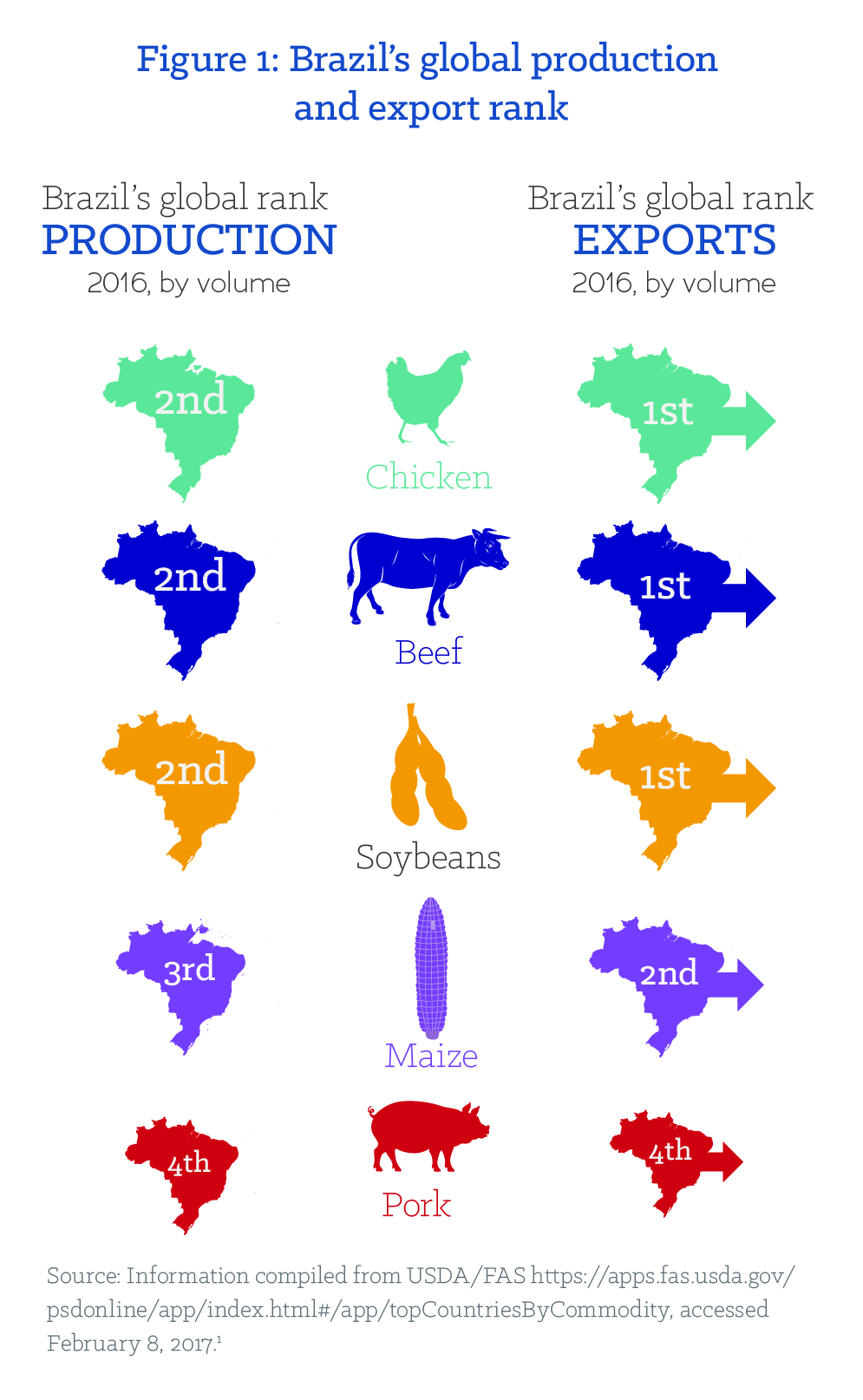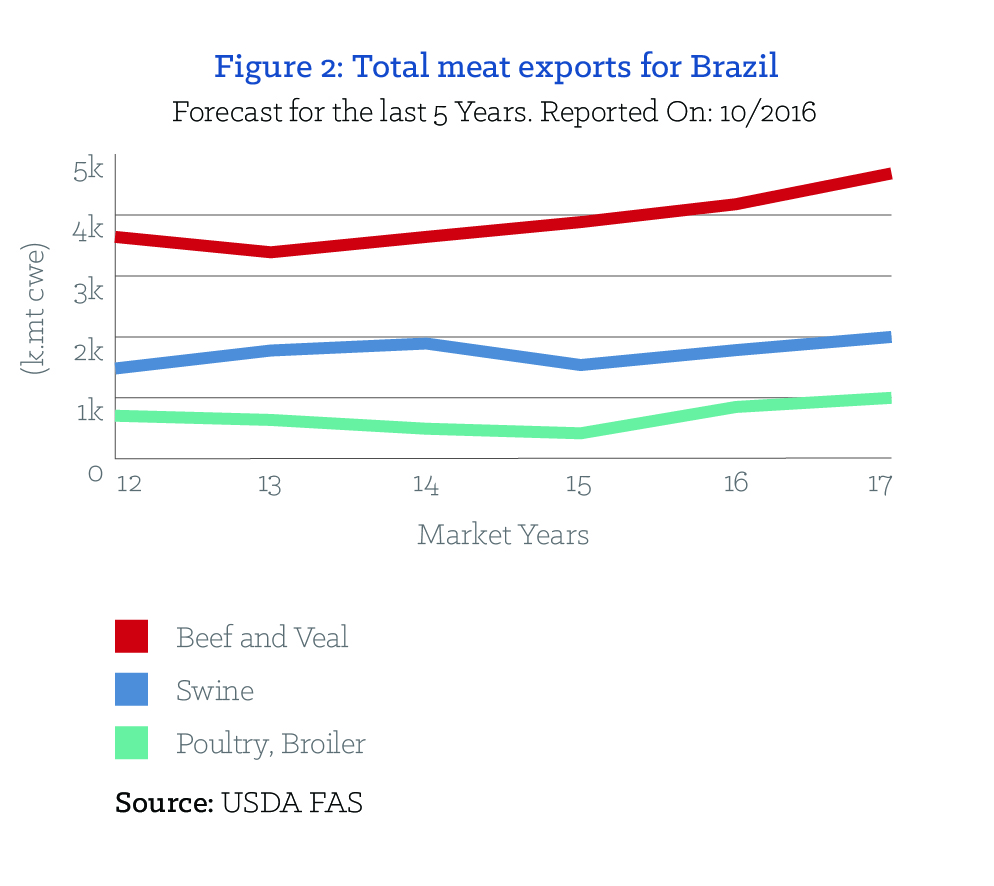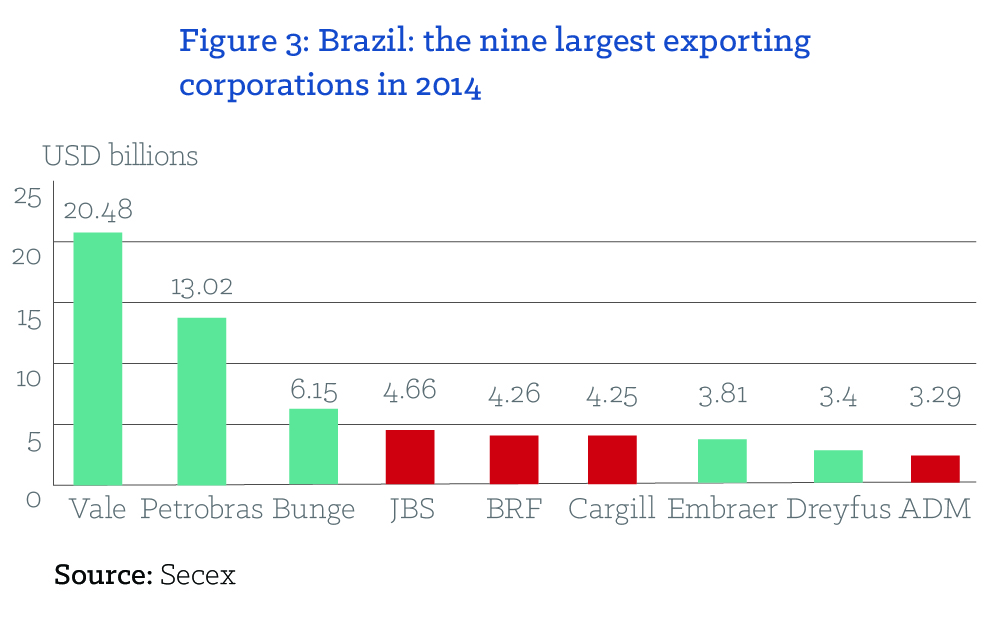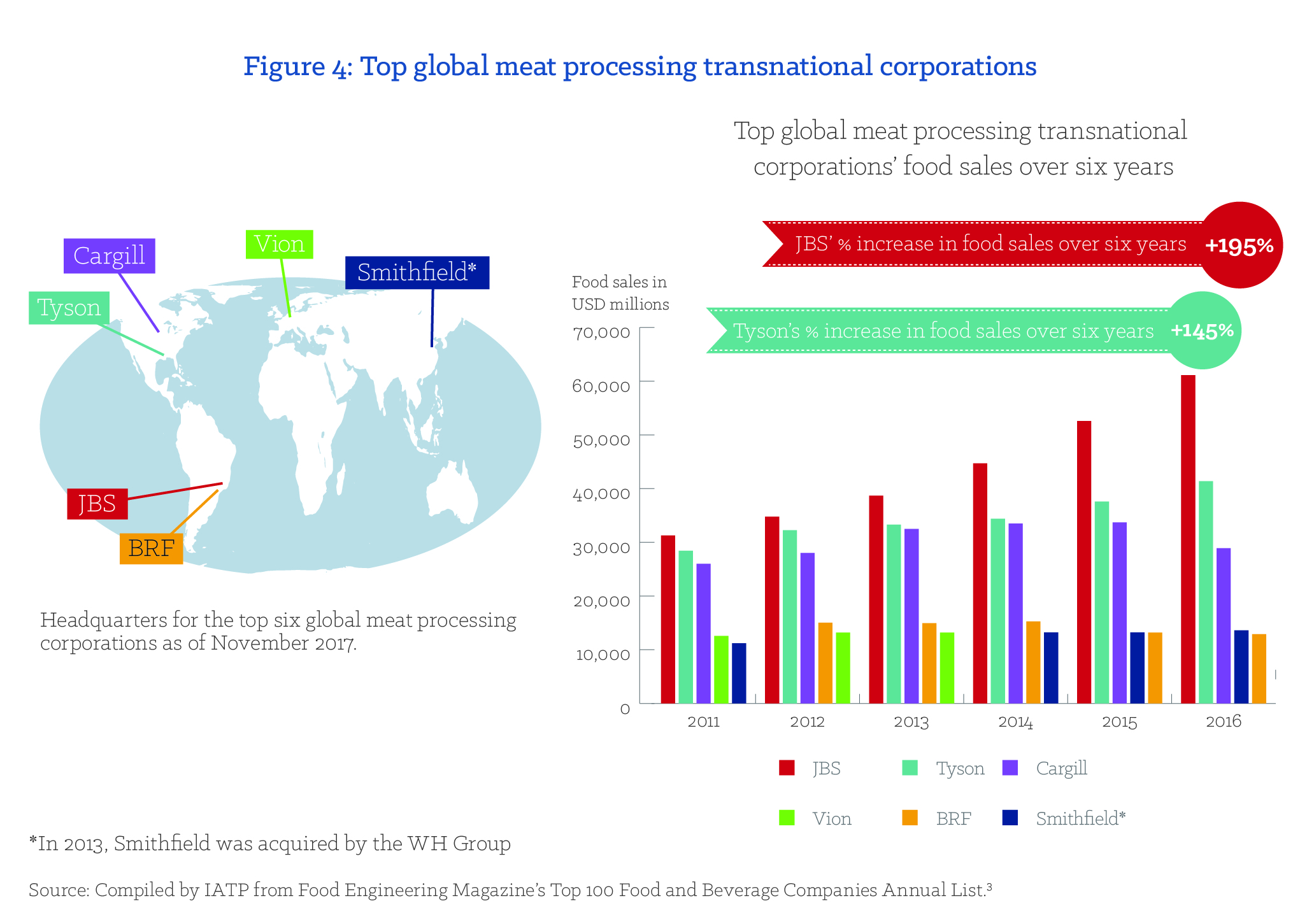What Processed Beef Products Come From Brazil
Introduction: Brazil's Rise to the Top of the Global Meat Complex
Brazil is the world's leading exporter of soybeans; the second largest exporter of maize; and the globe's largest beef trader, exporting more than 20 percent of the world's beef (Figures i and two). It has overtaken the United States to become the biggest exporter of poultry in the world, close to 39 percent of total global exports. With China drastically increasing its pork imports in the last 2 years, Brazil has likewise stepped in to meet this demand. The massive expansion in product has had dramatic impacts on Brazilians linked to the supply concatenation and on Brazil'southward prized environs, and has additionally fabricated Brazil increasingly dependent on these commodities to maintain a trade surplus.



Becoming a leader of the global meat complex has come with a stark increase in the concentration of ability to a handful of transnational corporations (TNCs) at every step of the Brazilian meat product chain. This has been achieved in a brusk span of fourth dimension—since the turn of this century—and consolidated in simply the final ten years.
Equally Figure 3 illustrates, half dozen of the nine largest exporting companies in 2014 were grain traders and meat packers. The other three, Vale, Petrobras and Embraer, are mining, oil and aeronautical industry giants, respectively. The rise of the meat industry has come up with the assistance of the Brazilian authorities.
Brazil's "National Champions" and the function of the Brazilian National Evolution Bank
From 2007 to 2013, the Brazilian National Development Bank (Banco Nacional de Desenvolvimento Econômico eastward Social [BNDES]) implemented the and then-called National Champions policy. The thought was to select Brazilian exporting companies and transform them into large transnational corporations that bring home large revenues. The beneficiaries, which included some of the largest Brazilian meatpacking corporations also as oil and mining corporations, absorbed two-thirds of the allocated BNDES resources. These "champions" included JBS-Friboi (known globally equally JBS), Marfrig and Brasil Foods (BRF). These companies received large volumes of resources, non only through subsidized loans, merely too through the purchasing of debentures and company shares through BNDES's investment arm, BNDES Participações (BNDESPar). For instance, BNDESPar owns close to 25 per centum of JBS's capital while the Brazilian public bank Caixa Econômica Federal owns 10 percentage.
Frequent mergers and acquisitions and consolidation across several meat segments (beef, pork, poultry, etc.) and other parts of the value concatenation (feed, additives) are primal to the meat industry's strategy in increasing profits. In this way, the companies used a large portion of BNDES resource to swallow upwards small businesses. They connected to rapidly aggregate power through further mergers and acquisition activities in fundamental meat producing and consuming countries.

Brazil'south trade policy already contributes to a path of dependency on exporting land-based, natural resources intensive commodities and importing much more expensive, value-added products with a high technology content. BNDES' use of public resources to exacerbate this trend makes little sense to many Brazilian civil society organizations (CSOs). While the National Champions policy has delivered massive profits to chief executives and shareholders of major corporations, many feel that taxpayers have gained little from big sums of public money existence diverted to these large conglomerates.four Instead, their dramatic increase in economic and political might has enabled them to operate above the law. For instance, last twelvemonth, JBS chairman Joseley Batista was charged with corruption by Brazil'due south independent public prosecutor in connection to JBS' belongings company, J&F Investimentos SA. In February of this twelvemonth, federal prosecutors mandated that Batista's avails exist frozen in connection to fraud related to J&F's interest with state owned alimony funds.v Things connected to get worse in the form of the yr (meet Tainted meat and reputations).
JBS
JBS' value jumped from USD one billion in 2004 to USD 34 billion in 2014, every bit information technology expanded from beef to poultry and other products.6 JBS at present boasts of owning 340 operations that produce products ranging from meat and leather to biodiesel and metallic packaging and cleaning.7 Information technology is the world's largest exporter of meat, selling to over 150 countries. In the U.S., it is the leading processor of beefiness, pork and lamb and the 2nd largest poultry producer; it is as well the leading beef producer in Canada and the largest cattle-feeder in the earth.viii Information technology additionally has operations in Argentina, Commonwealth of australia, Mexico, Paraguay and Uruguay.
JBS, in particular, has mastered the fine art of growth through mergers and acquisitions. In 2013, JBS acquired Seara, the 2nd largest chicken and pork processing company in Brazil. Previously, Marfrig had bought it from Cargill in 2009. In 2015, JBS bought Cargill'due south largest pork facility in the U.S., and in Europe, it acquired Moy Park, one of the largest European poultry and processed food facilities that belonged to Marfrig.nine In Brazil, it also caused the French subsidiary Frangosul (endemic past Doux) and the U.Due south. subsidiary Tyson Brazil (from Tyson Foods).10 JBS' expansion into other exporting countries has allowed the company to avoid food safety restrictions imposed on Brazilian exports—besides known every bit "non-tariff barriers" or sanitary and phyto-sanitary (SPS) restrictions. Frequent outbreaks of Human foot and Oral fissure Disease and other zoonotic diseases in Brazil go along to impose barriers on Brazilian exports. Every bit JBS's foreign investments have grown, such as in the U.S. and Commonwealth of australia, it has allowed the company l percent of the earth market that would have otherwise remained closed had it remained only in Brazil.
BRF
Corporate concentration in the Brazilian poultry processing sector increased significantly when BNDES financed the merger of two Brazilian giants in the meat processing and frozen foods sector, Sadia and Perdigão, in 2009. Pension funds of two large state enterprises—Petrobras Social Security Foundation (12.49 percent) and the Banco do Brasil Employees' Pension Fund (ten.94 percent)—are BRF's largest shareholders.
The visitor is now the largest international exporter of chicken (20 percentage of global exports and 9 percent of global trade in animal protein) and the 7th largest food corporation in the world, according to its annual study.sixteen Unlike JBS, BRF's key strategy entails the conquering of pocket-sized companies in emerging economies that take meaning potential for increasing meat consumption.
BRF owns Plusfood in Europe—a poultry processor with plants in England and the Netherlands that sells to major supermarkets in Europe.17 In 2014, the company expanded its processing plants in Argentine republic, which now produce poultry, margarine, cheese and beefiness.eighteen
Its recent acquisitions in the Middle Eastward and Turkey accept also allowed it to go a major processor of halal meat for Islamic markets. In January, BRF consolidated its production of halal meat destined for Islamic countries under a new subsidiary in Dubai called OneFoods. This includes transferring the assets of eight slaughterhouses in Brazil that must export using halal production standards along with grain storage facilities, chicken hatcheries and feedmills.nineteen 1 of the first actions of this new subsidiary was to acquire a sixty percent stake in Banvit, Turkey'south largest poultry processing company. The Qatar Investment Authority (a Qatari Sovereign Wealth Fund) will ain the remaining 40 percent.20
Marfrig
Marfrig states that it is the 2nd largest beef operator in Brazil, the largest beef processing company in Uruguay, and the largest importer of meat in Republic of chile. With a physical presence in 12 countries and its candy products in over a 100, the visitor boasts of processing up to 3.8 million head of cattle and 2.3 one thousand thousand head of sheep a year.21 Through its ownership of Keystone—one of the largest international suppliers of industrialized foods to big restaurant and retail bondage such as McDonald's, Subway and Wendy'southward—it besides processes 250 million birds and manufactures 580 thousand tons of food every yr.22
Conclusion
The Brazilian authorities's initiative to create National Champions has undoubtedly helped JBS, BRF and other corporations rising to the top of the global meat circuitous. It is also clear that this back up has led to enormous profits for the CEOs and shareholders of these companies. From an economic development perspective, there is no compelling testify that the uppercase used to larn meat processing companies abroad and the resulting profits has benefited Brazilian citizens. Moreover, every bit we shall meet in the following sections, the rest of the Brazilian population—every bit well as others around the globe—have been forced to bear the social and environmental costs of their ascension.
To keep reading, download the full study.
Read the executive summary.
Baixe o resumo executivo em português. (Download the executive summary in Portuguese.)
Laden Sie eine deutsche Übersetzung einer früheren Version der Zusammenfassung vom Apr 2017 herunter. (Download a German language translation of an early version of the executive summary from April 2017.)
Source: https://www.iatp.org/the-rise-of-big-meat
0 Response to "What Processed Beef Products Come From Brazil"
Post a Comment